- What are Knowledge Management Tools?
- Top 10 Knowledge Management Tools in 2025
- 1. Confluence
- 2. SharePoint
- 3. Guru
- 4. Zendesk Guide
- 5. Document360
- 6. Helpjuice
- 7. Trainual
- 8. Sift
- 9. Stonly
- 10. Notion
- What to Consider When Choosing Knowledge Management Tools?
- Beyond Traditional Knowledge Management Tools: GoInsight.AI
- Conclusion
For businesses, managing knowledge is more than just storing documents. The right Knowledge Management Tools help teams capture expertise, streamline collaboration, and keep everyone aligned. Whether you’re running a growing startup or a large enterprise, choosing the right platform can make the difference between confusion and clarity.
In this article, we’ll explore some of the best tools available today and highlight how they can empower your organization to work smarter together.
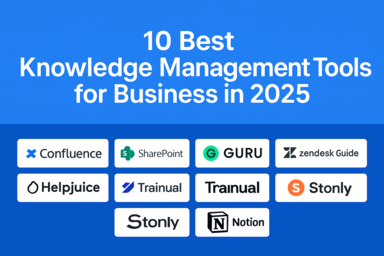
What are Knowledge Management Tools?
At its core, a Knowledge Management Tool is software that helps organizations capture, organize, and share information in one central place. Instead of knowledge being scattered across emails, chat threads, or someone’s personal drive, these tools make it easy for employees to find what they need, when they need it.
Broadly speaking, Knowledge Management Tools can take different forms:
- Internal Documentation & Collaboration: Used for storing company knowledge, project notes, and team communication.
- Customer Knowledge Bases: Designed to provide FAQs, product guides, and self-service support.
- Training & Onboarding Systems: Help standardize processes and make it easier to bring new employees up to speed.
- AI-Powered Knowledge Platforms: Use artificial intelligence to surface the right information at the right time.
The benefits are clear: less time wasted searching for information, smoother onboarding for new employees, better customer support, and a stronger culture of collaboration. In short, the right Knowledge Management Tool can turn knowledge into a real competitive advantage.
Top 10 Knowledge Management Software in 2025
Here are some of the most effective knowledge management software businesses rely on today, each with its own strengths and focus areas.
1. Confluence
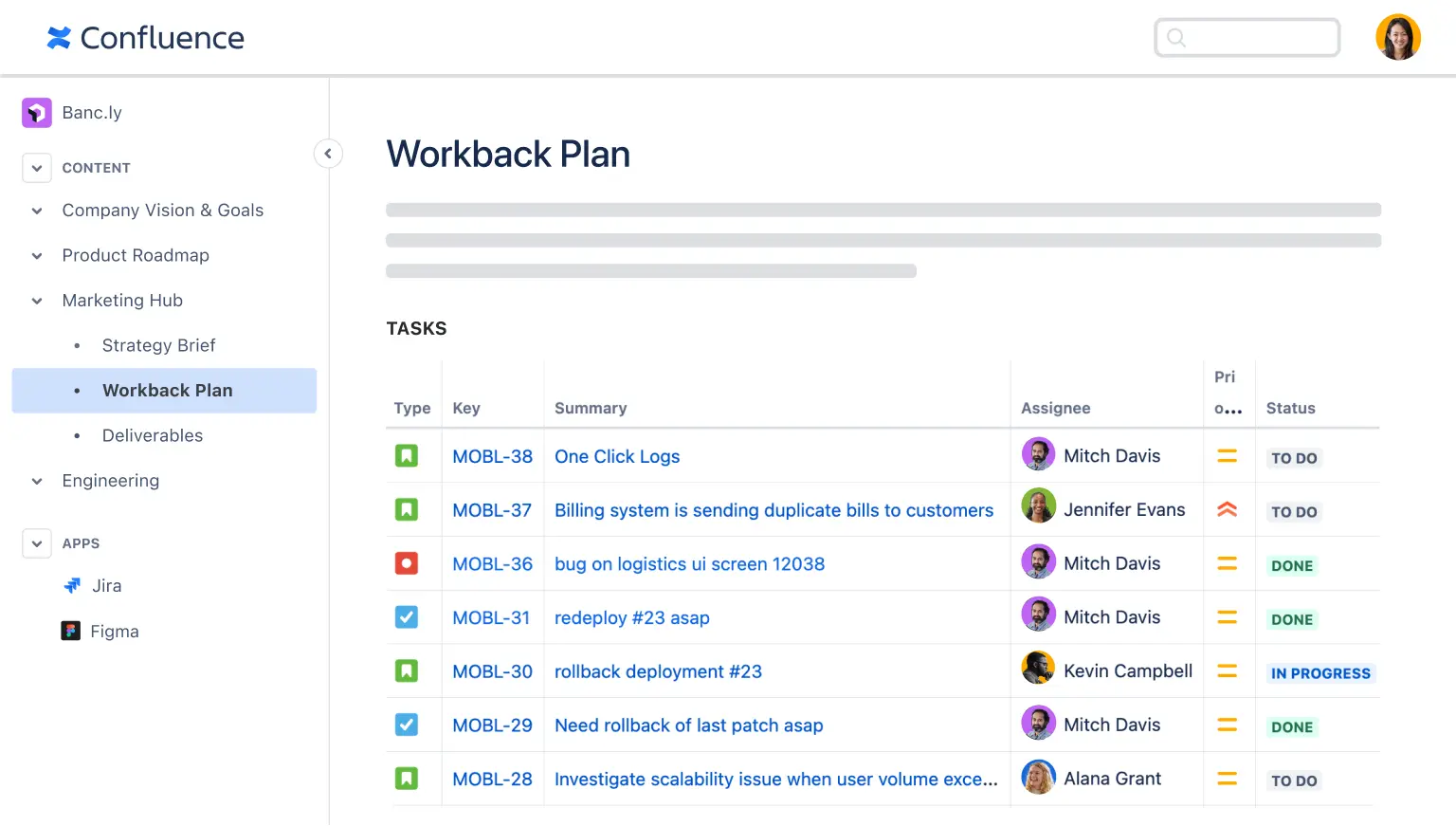
Confluence is a powerful collaboration and documentation tool designed for teams to create, organize, and share knowledge in a structured way. It is particularly popular among agile and product teams, offering ready-to-use templates, flexible content spaces, and seamless integration with Jira and Trello. With robust search capabilities and version history, it helps maintain project transparency and makes company-wide knowledge easily accessible.
Pros:
- Strong integration with the Atlassian ecosystem (Jira, Trello).
- Easy-to-use project and document templates.
- Powerful search and structured content hierarchy.
- Suitable for medium to large teams.
Cons:
- May feel overwhelming for smaller teams.
- Limited offline access.
- Requires setup to avoid clutter.
Pricing:
- Free plan available. Paid plans start at $5.16/user/month.
2. SharePoint

Microsoft SharePoint is an enterprise knowledge management software for document management, intranet portals, and cross-team collaboration. It integrates seamlessly with Microsoft 365, enabling users to work effortlessly across Word, Excel, Teams, and Outlook. SharePoint excels at version control, permission management, and building custom portals, making it a trusted choice for large organizations with stringent compliance requirements.
Pros:
- Robust document management with version control.
- Seamless integration with Microsoft 365 apps.
- Flexible for intranet and knowledge portal creation.
- Strong security and compliance features.
Cons:
- Complex setup and administration.
- Steeper learning curve for new users.
- Customization can require IT support.
Pricing:
- SharePoint Online plans start at $5/user/month.
3. Guru
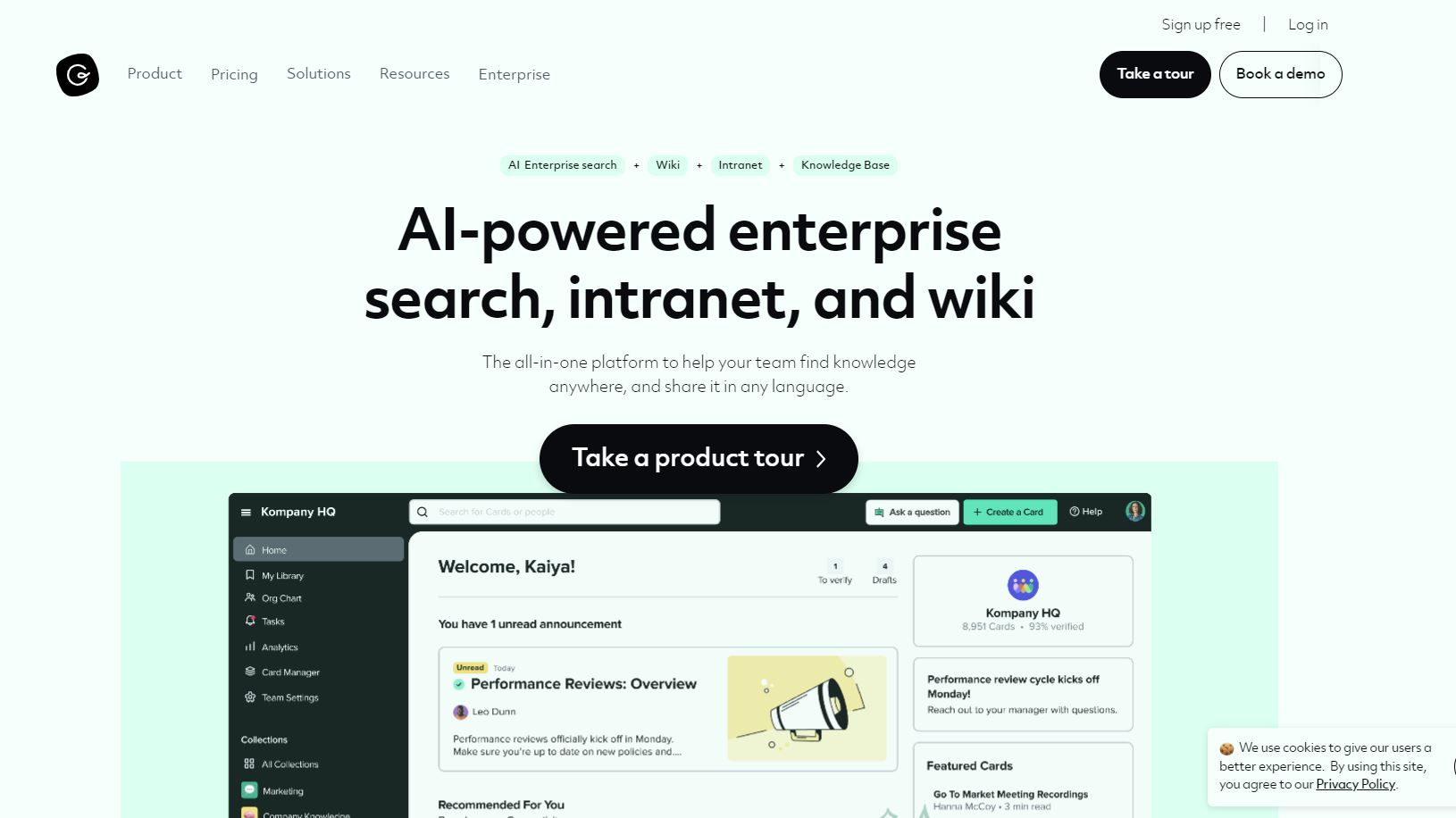
Guru is a modern knowledge management platform designed to integrate verified, reliable information directly into employees' daily workflows. Teams can access knowledge through Slack, Microsoft Teams, or browser extensions without switching applications. The platform places particular emphasis on knowledge validation, ensuring content remains accurate and up to date. Its intuitive design enables rapid and efficient adoption, making it especially suited for fast-paced teams.
Pros:
- Real-time knowledge verification ensures content accuracy.
- Strong integrations with daily work apps.
- Intuitive interface for quick adoption.
- Built-in reminders foster a knowledge-sharing culture.
Cons:
- Limited advanced formatting for long documents.
- Best suited for smaller knowledge bases.
- Offline access is limited.
Pricing:
- Free plan available. Paid plans start at $15/user/month.
4. Zendesk Guide

Zendesk Guide is a customer-facing knowledge base platform designed to help businesses deliver superior self-service experiences. Deeply integrated with the Zendesk customer support suite, it enables teams to build searchable FAQs, product documentation, and community forums. By reducing ticket volume and empowering customers to find answers independently, this platform effectively boosts efficiency and satisfaction.
Pros:
- Native integration with Zendesk customer support.
- Easy-to-build FAQs and help centers.
- Supports multilingual content for global teams.
- Strong analytics to track article performance.
Cons:
- Best suited for customer support, not internal KM.
- Limited customization without coding support.
- Higher cost if bundled with full Zendesk suite.
Pricing:
- Included with Zendesk Suite plans, starting at $55/agent/month.
5. Document360
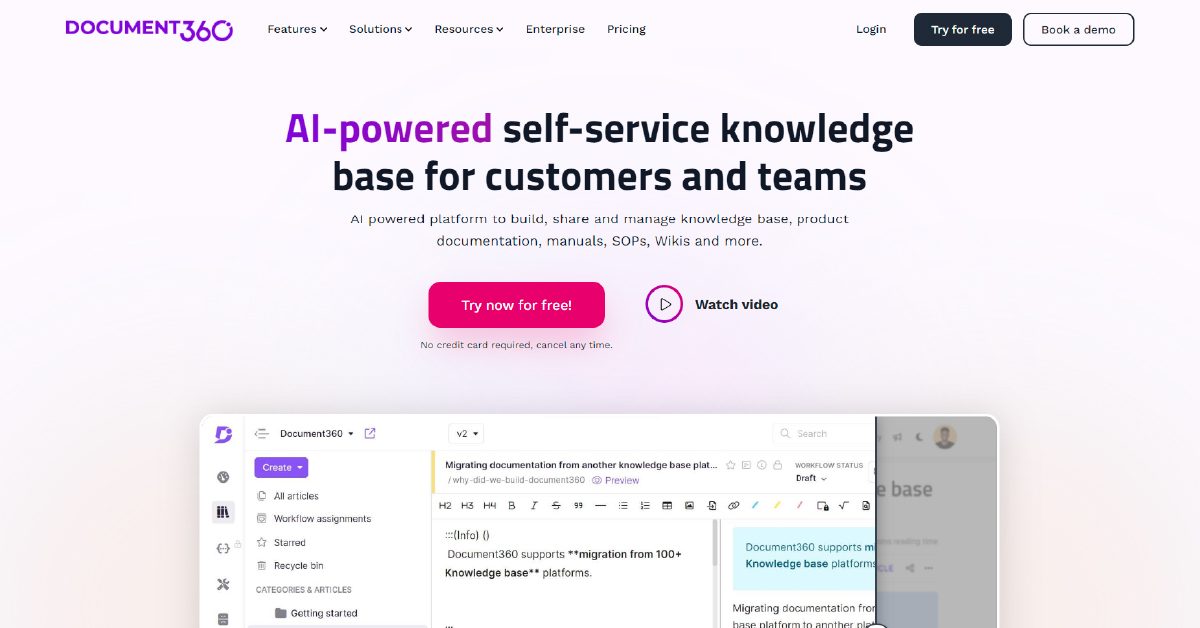
Document360 is a knowledge base software specifically designed for creating and managing product documentation, FAQs, and internal knowledge centers. Its clean, structured editor offers advanced features such as version control, hierarchical categorization, and multilingual support. Through integration with customer support and analytics tools, this platform is particularly well-suited for SaaS companies and technical teams requiring precise, organized documentation.
Pros:
- Advanced editor with version control and markdown support.
- Clear content hierarchy and navigation.
- Supports multilingual documentation.
- Built-in article performance analytics.
Cons:
- Learning curve for non-technical users.
- Limited collaboration features compared to full KM platforms.
- Lacks built-in chat or communication tools.
Pricing:
- Custom pricing based on company size and needs.
6. Helpjuice
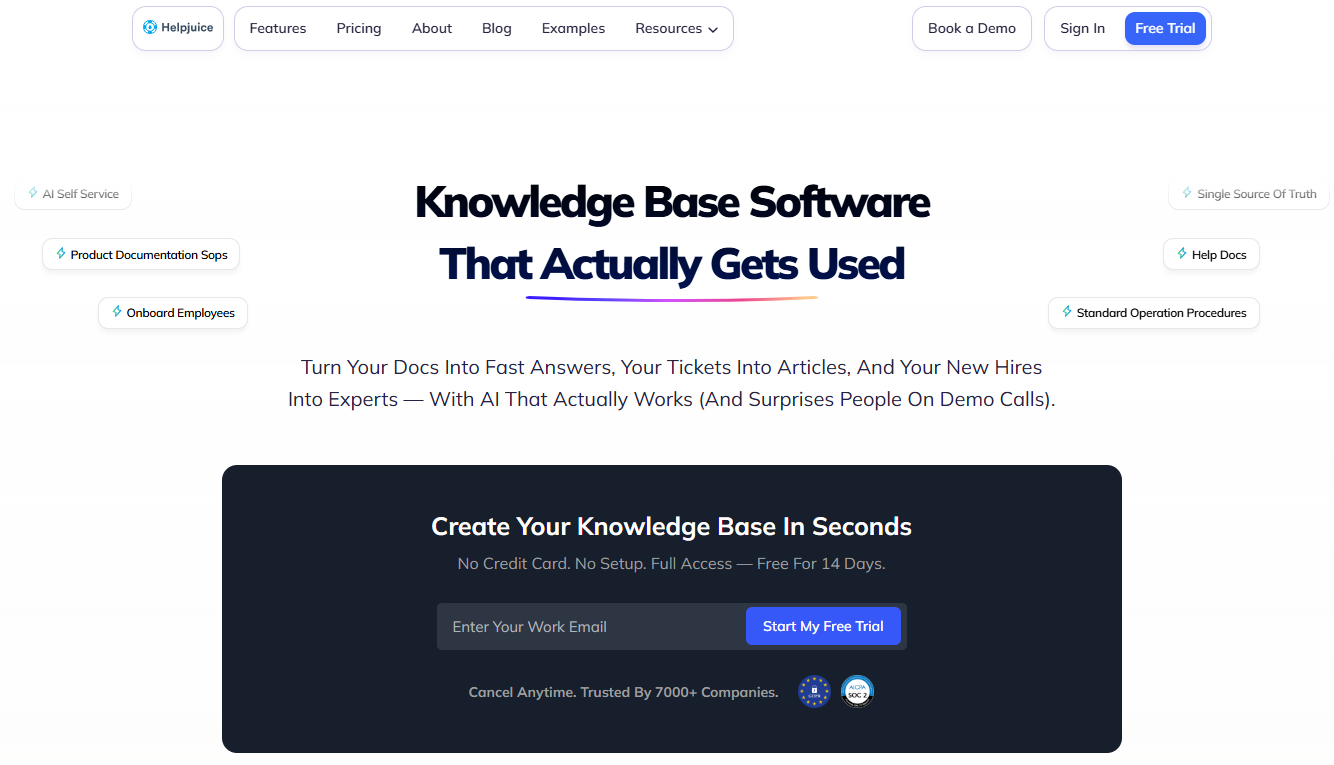
Helpjuice is a highly customizable knowledge base platform focused on helping businesses scale customer support and internal documentation systems. Its standout strengths lie in advanced customization features that enable teams to design knowledge bases aligned with their brand identity. Detailed analytics track article usage, while a streamlined editor supports rapid content creation. The platform is favored by enterprises seeking flexibility and depth.
Pros:
- Highly customizable design and layout.
- Deep knowledge base usage analytics.
- Content creator-friendly editor.
- Robust customer support and onboarding help.
Cons:
- Less suitable for small businesses due to pricing.
- Limited project management or collaboration features.
- Can be overkill for lightweight documentation needs.
Pricing:
- Plans start at $249/month for up to 30 users.
7. Trainual
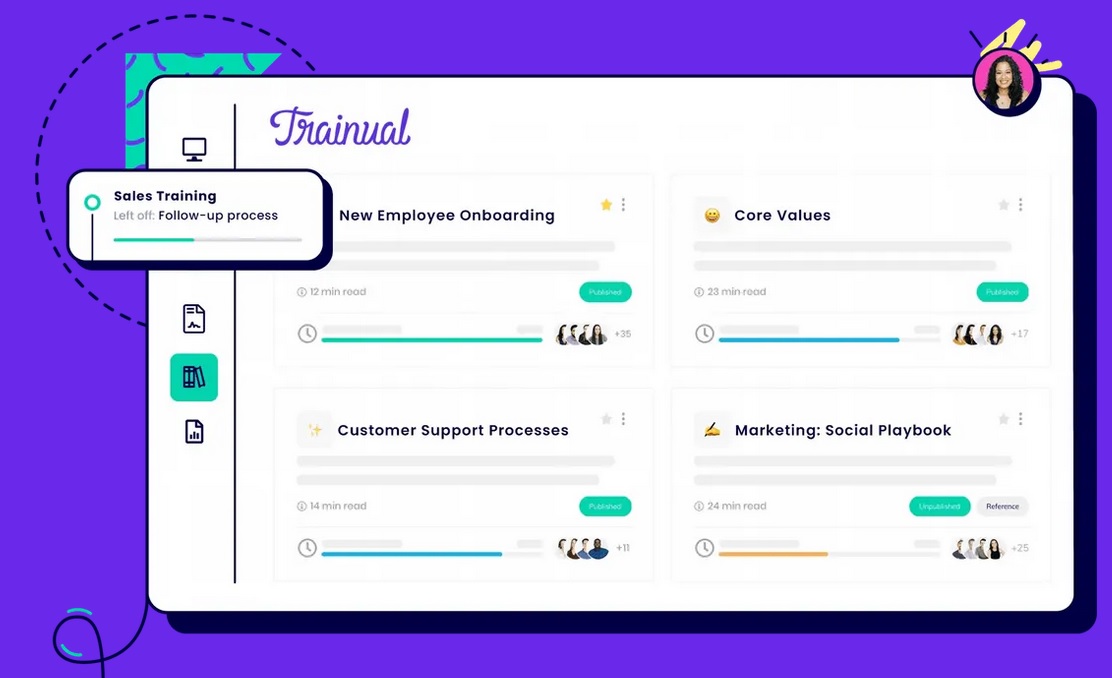
Trainual is an onboarding and training-focused knowledge management platform designed to help businesses document processes, SOPs, and company policies. It provides teams with an intuitive way to standardize workflows, ensuring consistency across departments. With features like quizzes, progress tracking, and multimedia content, Trainual serves as both a knowledge base and training tool, making it highly popular among rapidly growing companies.
Pros:
- Excellent for onboarding and SOP documentation.
- Supports multimedia content.
- Quizzes and progress tracking for training validation.
- Intuitive and user-friendly interface.
Cons:
- Not ideal for complex knowledge bases.
- Limited collaboration tools for large teams.
- Pricing can add up as team size grows.
Pricing:
- Plans start at $249/month for 10 seats.
8. Sift
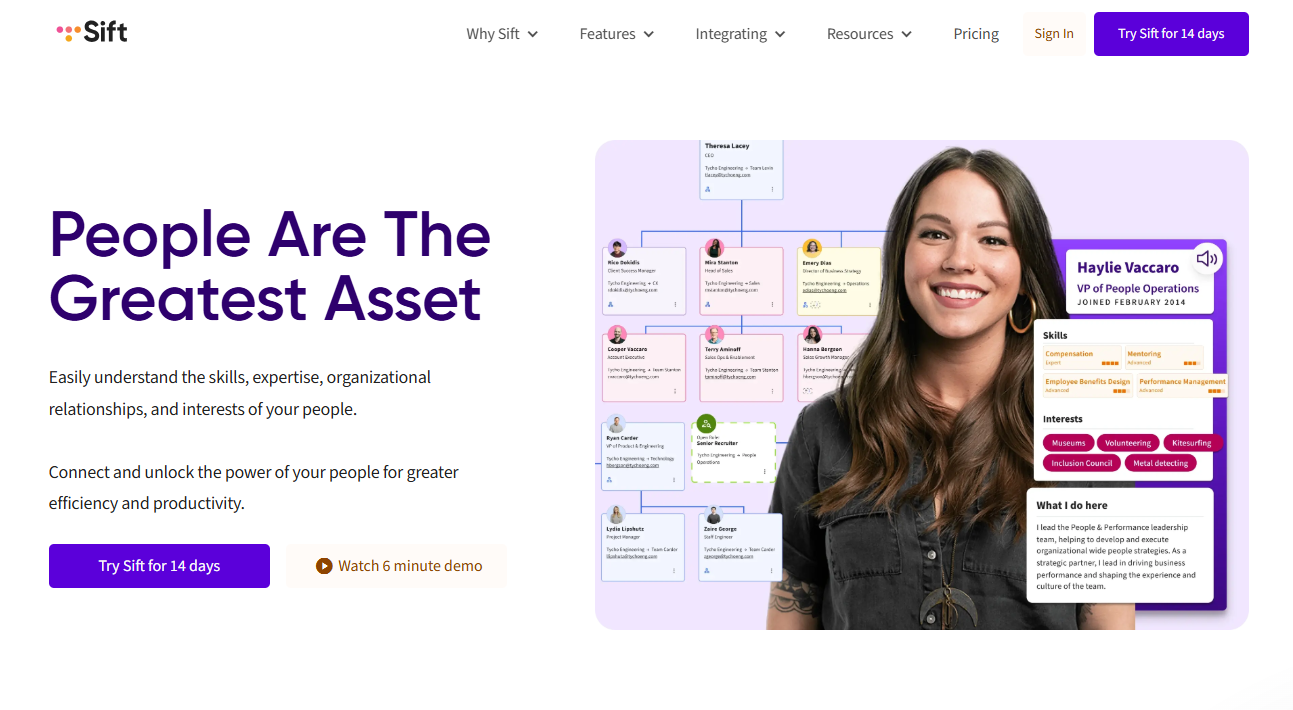
Sift is a people-focused knowledge management platform that helps employees discover expertise, organizational structures, and internal resources. It’s designed to make company knowledge more human-centric by providing employee profiles, skill directories, and organizational charts. This makes it especially useful for large enterprises that need to connect people with knowledge and break down silos.
Pros:
- Strong focus on people and expertise discovery.
- Interactive org charts and skill directories.
- Enhances internal collaboration and visibility.
- Good fit for large, distributed organizations.
Cons:
- Less suitable for traditional document-based knowledge bases.
- Features can be excessive for small businesses.
- Highly dependent on accurate employee data entry.
Pricing:
- Plans start at $150/month for up to 20 users.
9. Stonly
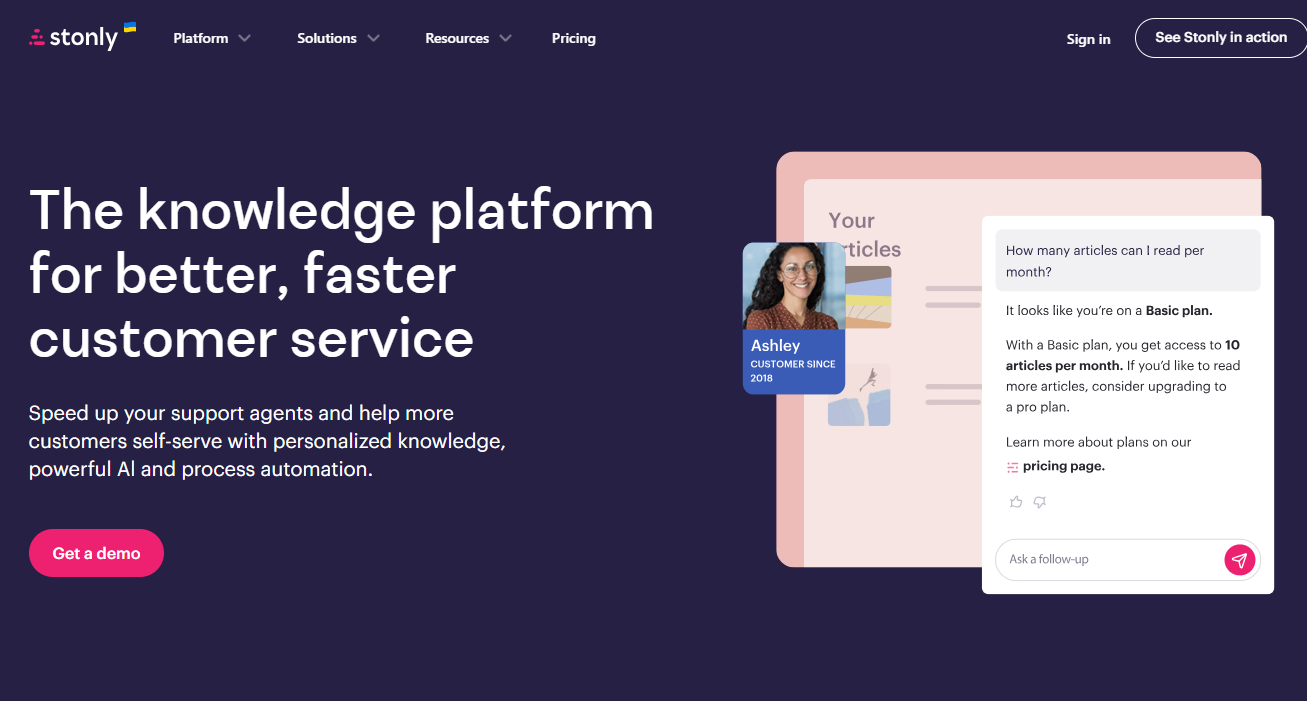
Stonly is an interactive knowledge management tool focused on step-by-step guides and tutorials. It replaces static articles with dynamic walkthroughs, enabling users to learn processes and solve problems in real time. This makes it highly effective for customer self-service, onboarding, and employee training. Stonly integrates with helpdesk and CRM systems, ensuring guided content is accessible whenever needed in any user scenario.
Pros:
- Interactive, step-by-step knowledge delivery.
- Great for customer support and onboarding.
- Easy integration with CRMs and support tools.
- Customizable design for branded experiences.
Cons:
- Not a traditional knowledge base for static documentation.
- Can require time to build interactive flows.
- Pricing may be high for smaller teams.
Pricing:
- Custom pricing based on company size and needs
10. Notion

Notion is a flexible, all-in-one workspace that combines note-taking, document sharing, task management, and collaboration features. While not specifically designed for knowledge management, many organizations leverage Notion to build internal knowledge bases, project hubs, and document repositories. Its greatest strength lies in its high customizability, adapting to diverse team workflows, making it highly valued by startups and creative teams prioritizing flexibility.
Pros:
- Highly customizable pages, templates, and databases
- Combines notes, tasks, and knowledge in one platform
- Easy to collaborate with comments and mentions
- Affordable and widely adopted, with strong community support
Cons:
- Can become messy without clear structure or guidelines
- Limited advanced knowledge management features
- Offline access can be unreliable for large databases
Pricing:
- Free for personal use; team plans start at $10 per user/month.
What to Consider When Choosing Knowledge Management Tools?
With so many options available, the challenge is not finding a tool but finding the right one that truly fits your business needs. Here are the most important factors to guide your decision.
- Centralized Knowledge Repository
A strong knowledge management platform should serve as a single source of truth for your organization. Centralization reduces duplication, prevents information silos, and ensures employees can always access reliable and up-to-date resources in one place.
- Advanced Search and Retrieval
Storing information is not enough if employees cannot locate it easily. Advanced search, tagging, and filtering features save valuable time, improve efficiency, and ensure knowledge remains actionable rather than hidden away in archives.
- Collaboration and Integrations
Knowledge becomes most valuable when teams actively share and apply it. The right tool should support real-time collaboration, comments, version control, and integrate smoothly with everyday apps like chat, email, or project management platforms.
- Security and Compliance
Protecting sensitive data is essential for any business, especially in regulated industries. A reliable platform should provide encryption, access controls, compliance certifications, and audit trails to safeguard both internal knowledge and customer information.
- Scalability and Customization
Your knowledge needs today may look very different in a few years. Scalable and customizable tools allow you to expand capacity, adjust structures, and create tailored workflows so the system evolves alongside your growing organization.
Beyond Traditional Knowledge Management Tools: GoInsight.AI
Traditional knowledge tools focus on storing and organizing information, but they rarely help teams put that knowledge into action. For modern enterprises, the real challenge is turning information into workflows that drive decisions and measurable outcomes. This is where GoInsight.AI steps in.
As an enterprise ready AI platform, it moves beyond static documentation by connecting knowledge directly with AI-powered workflows. Teams can automate repetitive tasks, accelerate decision-making, and ensure that information is always contextual and actionable. It supports dynamic collaboration with AI agents, enabling organizations to adapt to complex scenarios, reduce manual effort, and scale operations with confidence.
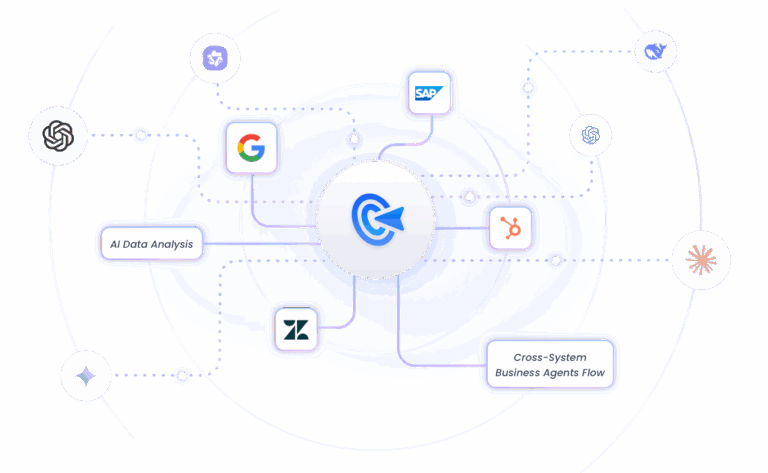
Key features:
- Visual intelligent workflow engine for low-code automation
- Integrated knowledge bases with contextual retrieval
- Multi-agent system for advanced AI collaboration
- Built-in security, compliance, and governance controls
- Human-in-the-loop and auto-continue for seamless cooperation
In short, GoInsight.AI bridges the gap between knowledge and action. It transforms knowledge from a static resource into a living system that adapts, scales, and empowers enterprises to work smarter every day.
Conclusion
Choosing the right Knowledge Management Tool is more than just picking a platform to store documents. The best solutions help businesses centralize information, improve collaboration, and turn knowledge into actionable insights. From traditional tools to AI-powered platforms like GoInsight.AI, the key is finding a system that grows with your organization, supports your workflows, and empowers your teams.






Leave a Reply.